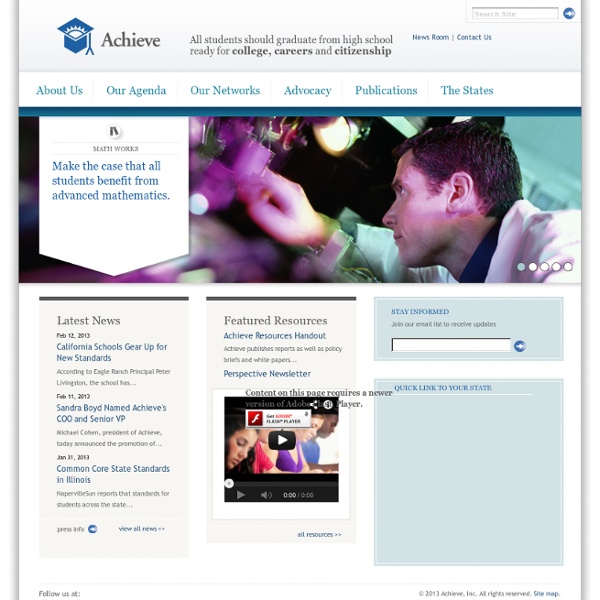



The Education Policy and Leadership Center The Math Forum @ Drexel University The Math Forum has a rich history as an online hub for the mathematics education community. A debt of gratitude is owed to the dedicated staff who created and maintained the top math education content and community forums that made up the Math Forum since its inception. NCTM will continue to make many of the most popular parts of the Math Forum content accessible to the mathematics education community. Problems of the Week The Math Forum created Problems of the Week as an integrated program that features problems by standard and additional teacher support materials. Continue Your Math Education Conversations in MyNCTM! MyNCTM is an online community where NCTM members can ask questions, network and connect with each other, start and join discussions, find and upload resources, and interact with education experts. For many years mathematicians, scientists, engineers and others interested in mathematics have played "year games" via email and in newsgroups. Year Game for 2018 Browse the Archives
Foroohar: To Compete, America Needs 6-Year High Schools Back in April of 2012, I wrote a column touting a 6-year high school in Brooklyn as a model for a new kind of secondary education. On Friday, President Obama traveled to New York to visit this same school, the Pathways in Technology Early College High School (P-TECH), where he discussed the importance of ensuring that the next generation of middle class American workers and entrepreneurs have the skills they need to compete and win in a global economy. In his State of the Union Address earlier this year, the President lauded the P-tech school, which is a collaborative effort between New York public schools and City University of New York and IBM, which donates time, expertise and mentors, but no money. Student at P-tech, many of whom will be the first in their families to graduate from high school, will come out with not only a high school diploma, but also an associate’s degree in a high-tech concentration like computer science or engineering. (MORE: These Schools Mean Business)
Center for the Study of Teaching and Policy: Home Page Welcome! The Center for the Study of Teaching and Policy investigates efforts to improve the quality of teaching and learning, the teacher workforce, and the systems of support for teachers’ work, in various contexts and at multiple levels of the K-12 educational system. To that end, Center researchers identify ways that policy actions, leadership, and reform efforts guide, direct, and support teaching and learning, thereby informing and enhancing the quality of learning opportunities in U.S. elementary and secondary schools. Research highlights Recent Center Reports The Center has recently released a synthesis report, Learning-focused Leadership and Leadership Support: Meaning and Practice in Urban Systems. Another line of Center research has produced an examination of the impact of Washington state’s incentives for teachers to attain National Board Certification and to work in challenging schools About the Center
Welcome to the Mathematics Assessment Project Pathways to Prosperity Network | Jobs for the Future The Pathways to Prosperity Network develops career pathways that span grades 9-14, enabling students to transition smoothly through high school, into higher education, and onto family-supporting careers—particularly in high-demand sectors like information technology, health care, and advanced manufacturing. The network's nine participating states engage regional employers and educators in building a system of pathways that are designed to launch young people into initial careers, while leaving open the prospect of further education. While pathways include either a comprehensive high school program of study or a career academy within a high school, all programs employ four key implementation strategies: Schools create early and sustained career information and advising systems.Employers provide a continuum of workplace learning opportunities.Intermediaries recruit business, nonprofit, and public employers as partners.Proponents advocate for supportive state policies.
the deliberate dumbing down of america STARTS NOW Adding to Hunter's diary on loony education theories of the reich wing .. [his] problem is that we're not teaching our children according to the proven principles of [18th] century England... It's much worse: Conservatives see liberal bias in class - and mobilize "Complaints that teachers push liberal ideology are trickling down from college campuses to the K-12 level.. activists have generated a wave of efforts to limit what teachers may discuss and to bring more conservative views into the classroom The founder of this loony bin in college is right-wing activist David Horowitz [who] has a distinguished history of intellectual defamation, historical inaccuracy and political bullying. Ignore them, they're just crazy ? David Horowitz Think Progress As an American who had spent many years working abroad, I had experienced traveling in and living in socialist countries. That was just the beginning.
www.turnonccmath.net Step to College | I-SEEED The Step to College (STC) Program’s mission is to increase the number of low-income, first-generation and historically underrepresented students who apply to, attend and graduate from our nation’s colleges and universities. Through college-level courses offered at local high schools, a longitudinal student tracking platform, personalized student mentorships, and case management, STC provides students in Oakland Unified School District and San Francisco Unified School District with the academic, social and emotional support they need to succeed in higher education. STC’s vision is that one day, all students will have the opportunity to earn a college degree that provides them with meaningful economic and personal prospects. STC students are high school juniors and seniors who take courses that train them in critical thinking, academic literacy, and technology, as well as other college preparatory courses for which they receive up to twelve (12) units of transferable credit from SFSU.
ePluribus Media Community || Collaborative Media for the Masses